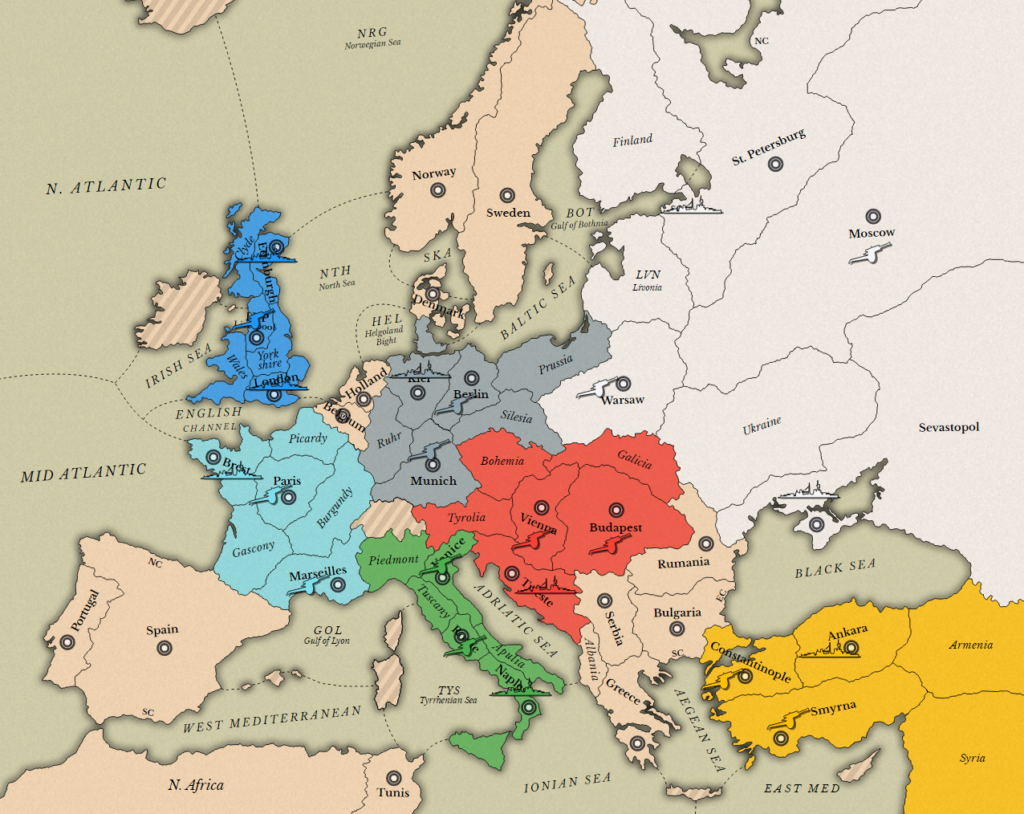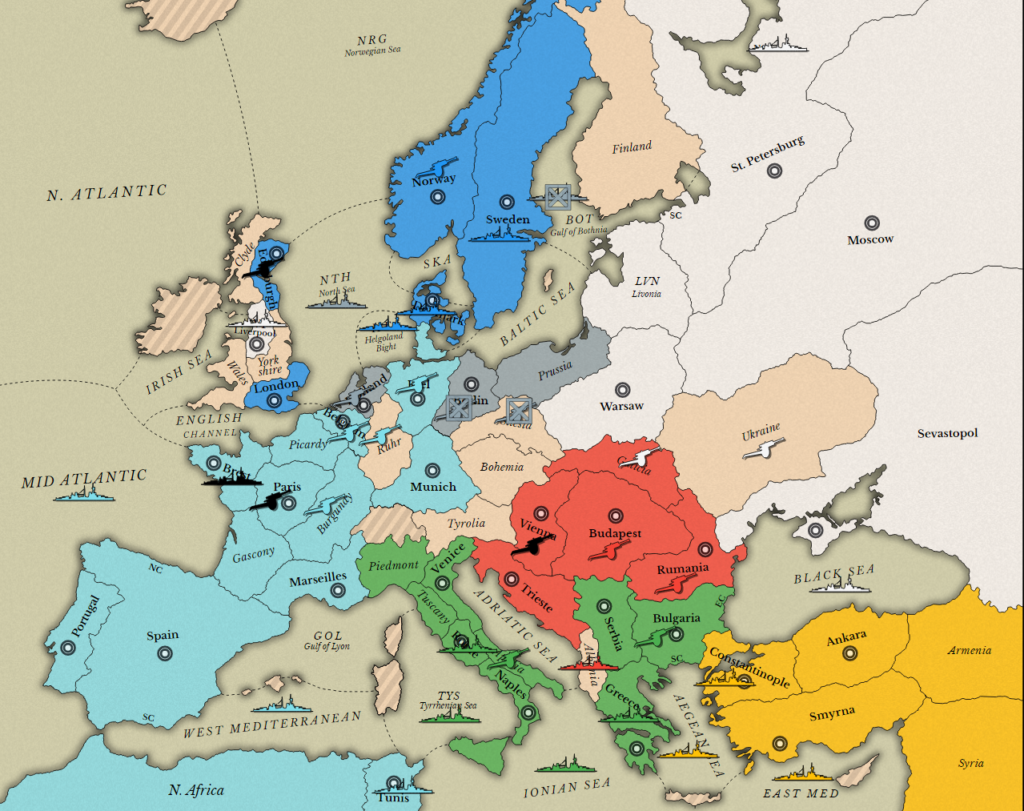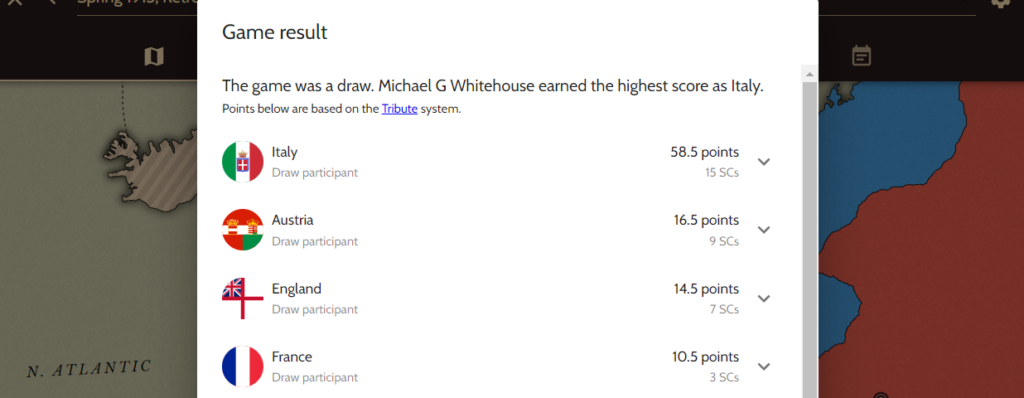There is a board game called Diplomacy. If you’re not familiar, think 7 player Chess played on a map of pre-World War I Europe.
The basic game mechanics are pretty simple which means that the real game is, surprise, diplomacy. It is a game about building the right alliances to get the other players to help you get your way while making them thinking you are helping them get their way.
This is a game full of deception, lying, and backstabbing. There can be only one winner, which means that at some point you have to turn on your erstwhile ally.
At least it seems that way.
Because there is another way to “win.”
The game ends when one player has 18 out of 34 “Supply Centers,” but the game also ends when all remaining players agree to a draw (or when time runs out in a tournament game). In either case, points are based on how many Supply Centers you control at that time.
And this is how I won a game of Diplomacy without ever lying, breaking a deal, or turning on an ally.
(For context, while the game is a board game, I play it online through a site/app called Diplicity, which is free if you want to give it a try.)
Without explaining how the game mechanics works, basically I’ll summarize it as more force tend to overwhelm less force, and the best way to create more force is through teaming up.
There are seven players: England, France, Germany, Russia, Turkey, Austria, and Italy. Here’s the map at the start of the game.

Don’t worry if you don’t understand board games, this story will make sense to you.
I was playing as Italy. Italy and Austria start in a rough spot. Austria has four neighbors which means it’s very easy for them to find themselves teamed up on and devoured. Italy, meanwhile lacks space to expand, which means that they can find find they languish in mediocrity until another player grows large enough to devour them.
I decided to try something different and play this game like I do most things in life: with honesty and integrity. I fully assumed this would not be a winning strategy, but what the heck.
Austria soon found themselves up against a combined force of Russia and Turkey, and were quickly on the ropes. I chose to support them, because the alternative was facing a stronger alliance once they were through with Austria.

This early support kept Austria in the game, and that made him generously offer me a piece of his territory so I could have some growth.
While the other players schemed, lied, and backstabbed, our alliance stayed true. When opportunities presented themselves, we could commit to capitalize on them without worrying about our backs.
In the end, it came down to a four player game of us (Italy and Austria) against an allied France and England, but the French/English alliance was once of convenience, and we convinced England that France was going for a solo win (which was true), so the alliance collapsed.

I later found out that Austria felt so grateful to me for saving him in the early game when I could have just turned on him, that he insisted that I be positioned to be the lead player in the draw and would not accept a draw until I was board leader, earning me the most points.
Conversely, earlier in the game, the French player had made a promise to me that he had no reason to make and no intention of keeping which he broke immediately. For no value, he earned my enmity for the remainder of the game, which may be some small part of how he ended up by the conclusion.
In the final scoring, there are 100 points to distribute, and I received 55 of them.

More importantly, I had never knowingly said one untrue thing to any player. I had never reneged on any deal. I had never turned on an ally.
If I can win a game that is all about lying and trickery with complete honesty, what does that teach us about business where it is almost never a zero sum game?
Too many business owners approach business like the France player. They say things like “it’s just business,” to justify unethical behavior.
They see not only their competitors as enemies to be defeated, but their vendors, staff, and even partners and investors.
They lie because they think it’s okay or even expected.
And they feel vindicated because eventually they find themselves with their back against the wall, no friends left, losing everything and they say “imagine how bad it would have been if I’d not looked out for number one?”
On the other hand, the Austria player committed fully to our alliance. Throughout the game, he honestly seemed a little confused by this level of loyalty, but he rolled with it because it was turning out well for him, and it did, getting him second place instead of eliminated.
He is like the business owner who does not see anyone as competition. The entrepreneur who looks at everyone she meets and asks “how can we work together?”
Like two friends of mine who are both web designers who had a conversation in which they discovered that they actually have very different specialties and could even subcontract some of their work to the other to make both stronger.
Then there are business owners who play like I did, deciding that they will work from a place of integrity no matter what.
It is better to lose with honesty and integrity than to win in deceit and avarice.
Because when you end up with your back to the wall after you’ve been honest in all dealings and generous to all people, you find that you have earned many friends.
In fact, you find that you are never really up against the wall, because you always have friends ready to return the favors you have done for them, even if you don’t remember doing so.
This is how it was towards the end of the game when Austria said he wouldn’t accept a draw until I was winning. I was thinking about how to be fair to my ally, and because of that, he chose to give me the win.
What do we learn from this game?
We learn that the best way to win is to focus on how make other people win because they, in turn, will choose to return that favor.
I’ll see you around the table!
Looking for some great win-win events? I’ve got some great ones coming up. Check them out here.
